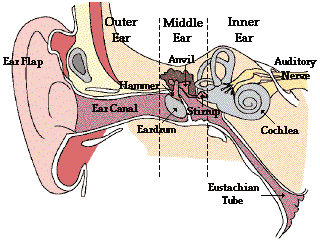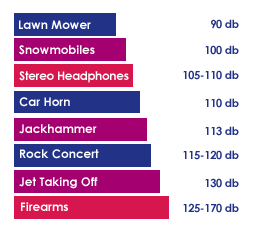Conductive Hearing Loss
Conductive hearing loss occurs when sound is not conducted efficiently through the outer and middle ears, including the ear canal, eardrum, and the tiny bones or ossicles of the middle ear. Conductive hearing loss usually involves a reduction in sound level or the ability to hear faint sounds. This type of hearing loss can often be corrected through medicine or surgery.
Sensorineural Hearing Loss
Sensorineural hearing loss occurs when there is damage to the inner ear (cochlea) or to the nerve pathways from the inner ear (retrocochlear pathway of the acoustic nerves) to the brain. Sensorineural hearing loss not only involves a reduction in sound level, or ability to hear faint sounds, but also affects speech understanding or ability to hear clearly.
Central Auditory Processing Disorders

A central auditory processing disorder (CAPD) occurs when auditory centers of the brain are affected by injury, disease, tumor, heredity or unknown causes. CAPD does not necessarily involve (although it may) hearing loss. Central auditory processing involves sound localization and lateralization, auditory discrimination, auditory pattern recognition, the temporal aspects of the sounds, and the ability to deal with degraded and competing acoustic signals. Therefore, a deficiency in one or more of the above listed behaviors may constitute a central auditory processing disorder. CAPD is often associated with Attention Deficit Disorder (ADD) or Attention Deficit Hyperactivity Disorder (ADHD).
Preventing Noise-Induced Hearing Loss
Noise-induced hearing loss can result from a single loud noise such as a firecracker or gunshot. Hearing loss can also result from prolonged exposure to noise over a period of time. It can occur gradually and painlessly. The best way to prevent noise-induced hearing loss is to take care of your hearing by protecting your ears from loud sounds.
We should not be exposed to 90 decibels (dB) of sound for longer than eight hours a day. For every 5 dB increase in volume, the maximum recommended exposure time is cut in half. Here are some examples of sound represented in decibels:

As you can see, there are many everyday sounds that can cause noise-induced hearing loss. Here are some simple things you can do to protect your hearing:
- Wear earplugs when you’re exposed to loud noise at work or play
- Pay attention to the noises around you. Turn down the volume on radios, TVs and stereos when you can. Whenever possible, leave noisy environments.
- Alternate a noisy activity with a quiet one to give your ears a rest.

Book your FREE Hearing Check
"*" indicates required fields
